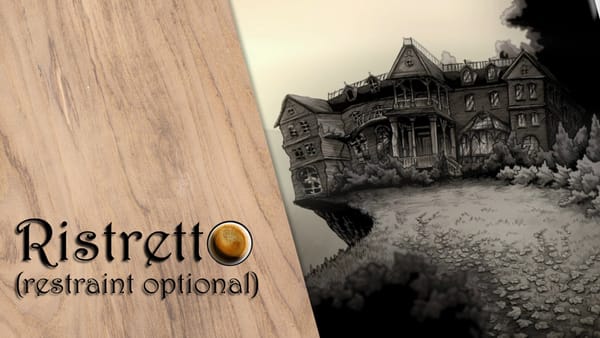Finding comfort in games
Why and how do we find comfort in games? What is a comfortable gaming experience even? A short look into Mischief's games library and their thoughts on their favourite 'comfort games'.

Throughout my years studying literature and film I’ve slowly come to realise that I am fascinated by genre theory. There is something so interesting about learning the interwoven ways culture shapes the way we structure and organise texts, media, and whatever else we can find. Categories and genres aren’t uncommon in gaming. Most of us are familiar with terms such as “Singleplayer”, “Multiplayer”, “FPS”, “Metroidvania”, “RPG”, which focus on specific gameplay elements or alternative terms that are more focused on a specific mood such as the “action” game or a “horror” game. These terms imply an easily applicable pattern and easy recognition when used in conversation. Which is why I would like to talk about my adoration for the term “comfort game”.
My steam account proudly proclaims my love for the game Hollow Knight (2017). At the time of writing, Steam states that I’ve spent 315 hours in-game. I don’t think anyone who knows me would be surprised; Especially since I would actually consider this game to be one of my all-time favourites. However, the question remains: Should we consider Hollow Knight a comfort game?
When we try to search the term “comfort game” online, we’re immediately confronted with the term “cosy game” instead. This implies an interchangeability of the terminology, something I heavily disagree with. Wikipedia defines a cosy game as a “video game genre that emphasizes non-violence and relaxation. […] They often have open-ended goals and encourage self-expression” (“Cosy Game”). If these terms are truly synonymous then Hollow Knight should certainly not be considered a comfort game, considering its violent nature, clear story oriented goal, and a modicum of difficulty as implied by the rare “souls-like” tag on its steam store page.
Scrolling further down on my search results, I come across two more definitions provided by Urban Dictionary. Thus, a comfort game can be defined as: “a game that is played to comfort the player. It is typically slower-paced with bright colours and is aimed at a casual audience.” or alternatively, “a game that you play while your parents are fighting and on the edge of having a divorce” (Comfort Game). Interesting. To be fair, following either definition, it becomes clear that Hollow Knight really isn’t a comfort game. However, I would like to look at these definitions further, since they showcase something truly fascinating: the concept that comfort can only be found in a game that is typically “slower paced and with bright colours”, which seems to be in accordance with the previously defined “cosy game” – now with another addition: the “casual audience”. Since I don’t wish to give up yet, I’ve decided to check the next article down the list. It is aptly named: “Comfort Gaming: The Psychology Behind Nostalgic Gaming” and was published 2023 on TheGamer. There the concept of comfort gaming is put together with ‘nostalgic gaming’, defined as a return to games “[…] from our childhoods, probably” (Bamsey). As the title suggested, the article puts a lot of focus on the importance of nostalgia behind the concept of comfort games. I played Hollow Knight for the first time in 2019, which was not during my childhood. Generally, it is hard to wear nostalgia glasses for a game that has not yet aged ten years. So, what then should I consider a comfort game if not Hollow Knight?
Well, actually, if one were to look at my Steam account just a bit more closely, it becomes evident that this game isn’t actually the game with the most in-game time. This is due to the fact that I’ve played the game originally on my Switch, thus, Steam does not accurately reflect how much time I’ve spent in Hallownest. Thus, the honour of the highest “total playtime” in my library goes to Stardew Valley. With the recent 1.6 update, I have to admit that this game had been on my mind. The temptation to return and start another farm sounded nice, but I had also just started a playthrough of Sun Haven. A farming sim that is still in Early Access and which adds a bit of fantasy into the farming life. My main character is a blue skinned Naga, what is there not to love? I played it for about 40 hours before I stopped. This is usually how I play these games, intense sessions over a short amount of time before dropping it. If I’m completely honest and tried to accumulate all the hours I’ve spent on different farming sims then the numbers would probably reach triple the amount that Stardew Valley currently proclaims on my Steam page. This would include games such as Harvest Moon DS (2005), Harvest Moon DS: Island of Happiness (2008), Rune Factory 4 (2012), which are just a few examples that come to my mind. The direct connection to nostalgia, the (mostly) non-violent nature of the farming sim – is this a comfort game? I should probably consider it, but then again – Stardew Valley is only a spiritual successor to these other games and is in itself not old enough to fall under nostalgia – the last update happened just a few weeks ago! The search for a comfort game in my library is thus not at all completed, which is why I’ll return to the Switch. I’ve mentioned before that I’ve played Hollow Knight, but there is another game that dominates the ‘hours played’ window with more hours than the other games combined: Animal Crossing: New Horizon (2020). I grew up with the previous entries, starting with Animal Crossing: Wild World (2005), so there’s definitely some nostalgia too. Thus, I have finally found a comfort game? Non-violent and relaxing and based on nostalgia, and I nearly forgot – it’s also slower-paced and with bright colours - the perfect comfort game of all time?
Well. Yes, but no.
Everyone already assumed that I would not leave it like this. I’ve started this post talking about how I adored the term and then refused to elaborate. So here it is: I think it is impossible to actually use this term as a means to categorise games on a larger scale, because how can we describe what is or is not comforting?
This category of games is interesting since it should not be conflated with the term ‘cosy game’ at all. A ‘cosy game’ is defined by its gameplay characteristics. Meanwhile, a ‘comfort game’ is defined by an outside element. Namely, whoever is playing the game. Another quick search defines comfort, according to the Cambridge Dictionary, as “a pleasant feeling of being relaxed and free from pain” and “the state of feeling better after feeling sad or worried, or something that makes you feel better in this way.” (comfort). Thus, this category will always remain subjective. One cannot create a list of comfort games for another person, since one is never able to truly know how someone will experience a game.
I return to my first question. Should I consider Hollow Knight a comfort game? Well, the game certainly frustrated me during my early playthrough, and it also challenged me as I made my way through the Hall of Gods and the Pantheon of Hallownest. However, when I think about this game, I am always thinking about familiarity. This game is comforting since I know exactly how the controls work, I recognise the patterns in fights and the back and forth keeps me on my toes, while simultaneously not being too complicated. After years of constantly returning to Hallownest, this game offers me both a challenge and a respite, a calming experience and a strenuous fight to accomplish my goals. This is the game I’ve returned to every few weeks, simply because it is calming. I enjoy the game, thus, I return. If I had a bad day, I will play this game.
Now, though, what about those farming simulators? They certainly fit the previous definition, which means they are certainly “cosy”, but are they also a comfort? They can be. As I’ve mentioned before, I have a tendency to drop off a farming sim quite quickly. The reasoning behind it is that I detest the automation that will be achieved. The first few months or years at your farm are always the most interesting ones – still trying to simply get by and then slowly seeing the fruits of your labour. It feels greatly satisfying. However, I usually get bored after too many sprinklers are installed, or after I’ve got enough money to not worry about anything any more. At that point, I feel restless. The open-minded goal is usually more daunting as soon as I have established my “basics”. At that point, it’s time to abandon ship and move toward another farming sim, where I’ll inherit another run-down farm from a random relative that promises me fulfilment in nature. I usually found comfort in these games during times when I felt like nothing that I was doing mattered. The slow build up of a farm is a lovely visual representation of progress, and it all feels important – or at least until you barely note the changes any more. I guess it’s time to move on.
Thinking back, I’ve come to realise that many games that I’ve played were never really too “complicated” with their systems. There were a fair share of action platformers, metroidvanias, and hack and slash games for the PlayStation, but I never really played RPGs. Moreover, I have to admit that I prefer a short, concise story over a long-winded overcomplicated story. Which is why the list of my favourite comfort games naturally includes Persona 5 Royal (2020).
At this point, it becomes clear that my favourite part about the term “comfort game” is that it is a nonsensical way of categorising things. The reason that Persona 5 (2016) and its updated re-release Persona 5 Royal are comforting is just a simple “I really liked that game and I like to re-visit it every now and again”. I wish there was more to it. The game didn’t ignite a sudden love for turn based strategic combat or these types of long-play RPG’s, but at least it made me aware that I should try them occasionally. It also made me realise that I can not always tell which games will become ‘a comfort game’ just by its mechanics or its looks. Instead, a game just has to ‘reach’ you at the right time. Persona 5 and funnily enough Final Fantasy XV (2016) were these long-winded games that I just got to experience at the ‘right’ time, and I’ve still got a really soft spot for those games. Back then I had found myself in a rough spot and these games were the perfect fit to simply let go for a bit. In these cases, a comfort game certainly enabled a bit of escapism.
This pattern had been repeated more recently as well, as I truly spent a lot of 2023 either playing The Legend of Zelda: Tears of the Kingdom and then the mega hit Baldur’s Gate III. I like DnD and the game looked interesting enough that I ended up giving it a try. BG3 is actually the game with the second most hours on my Steam account. Unlike all the previously mentioned games, this one had me constantly thinking through battles, consider strategies, going through and experiencing a world I've barely known since we usually play Homebrew DnD with our group. It was at the same time so familiar, but also still so different – it was the game I hadn’t known I needed until I actually played it.
This list of games all intend to do provide the player with a different set of goals, and they heavily differ in their gameplay. However, they all managed to provide me with feelings of comfort. The list could be longer, probably, but I do think there might be one more factor that ‘shapes’ what we call a comfort game – the concept of returning to it. The longevity of a game in a “gaming” rotation seems to make sense and could be what elevates a “fun” game to a “comfort game”, but those are just some thoughts about a category that intrigues me since I’ve never seen a category so heavily tied to subjectivity.
All of this to say: Yes. Hollow Knight is, or at least can be, a comfort game. (I would certainly consider it one.)





